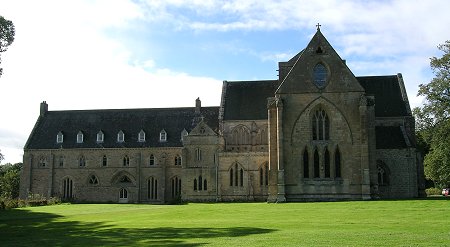
Pluscarden
Priory was founded by King Alexander II in 1230, who asked the
Valliscaulians, a Benedictine Order, to found a community here:
part of Alexander's agenda was to demonstrate his authority over
what had until recently been a disputed part of his kingdom. A
sister house was founded at
Beauly Priory,
and another at Ardchattan in Argyll. The Priory was probably
finished or nearing completion when the Edward I's English army
stormed through Moray in 1303. It isn't know if Pluscarden Priory
suffered damage at their hands, but it seems likely. If so,
repairs would have followed fairly quickly, and from 1345,
Pluscarden came under the control of the Bishop of Moray from his
seat in Elgin Cathedral.
The link with the
Bishop of Moray did not work in the Priory's favour. Some badly
judged local politics in 1390 led to Bishop Alexander Bur falling
out with Alexander Stewart, the younger son of Robert II. The
Bishop caused Alexander Stewart to to be excommunicated for
marital infidelity.
Alexander Stewart,
better known as the Wolf of Badenoch
responded by descending on Moray with an armed band of Highlanders
and burning down Elgin Cathedral,
the towns of
Elgin and
Forres, and
Pluscarden Priory.
Repairs followed, but by 1454 Pluscarden
Priory was again in a state of disrepair and the number of monks
had shrunk to around half a dozen. The Pope agreed an amalgamation
with
Urquhart Priory,
a Benedictine Priory five miles east of Elgin. A major programme
of rebuilding followed, now Benedictine, which continued well into
the 1500s.
At the time of the
Reformation in 1560 there were around a dozen monks at Pluscarden,
plus Prior Alexander Dunbar living in the nearby prior's house.
On Prior
Alexander's death in 1560,
Mary Queen of Scots
granted Pluscarden Priory and its remaining lands to the Setons.
In 1587 this religious appointment was translated into a temporal
Lordship, although significantly the head of the Seton family
retained the legal title of Prior, ensuring that the continuity of
the title was recognised in Scots law.